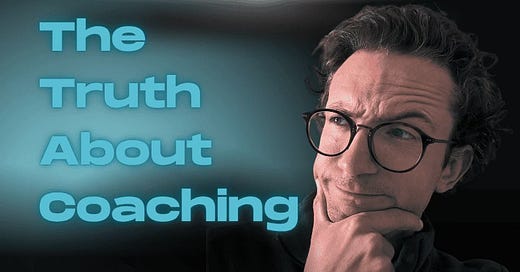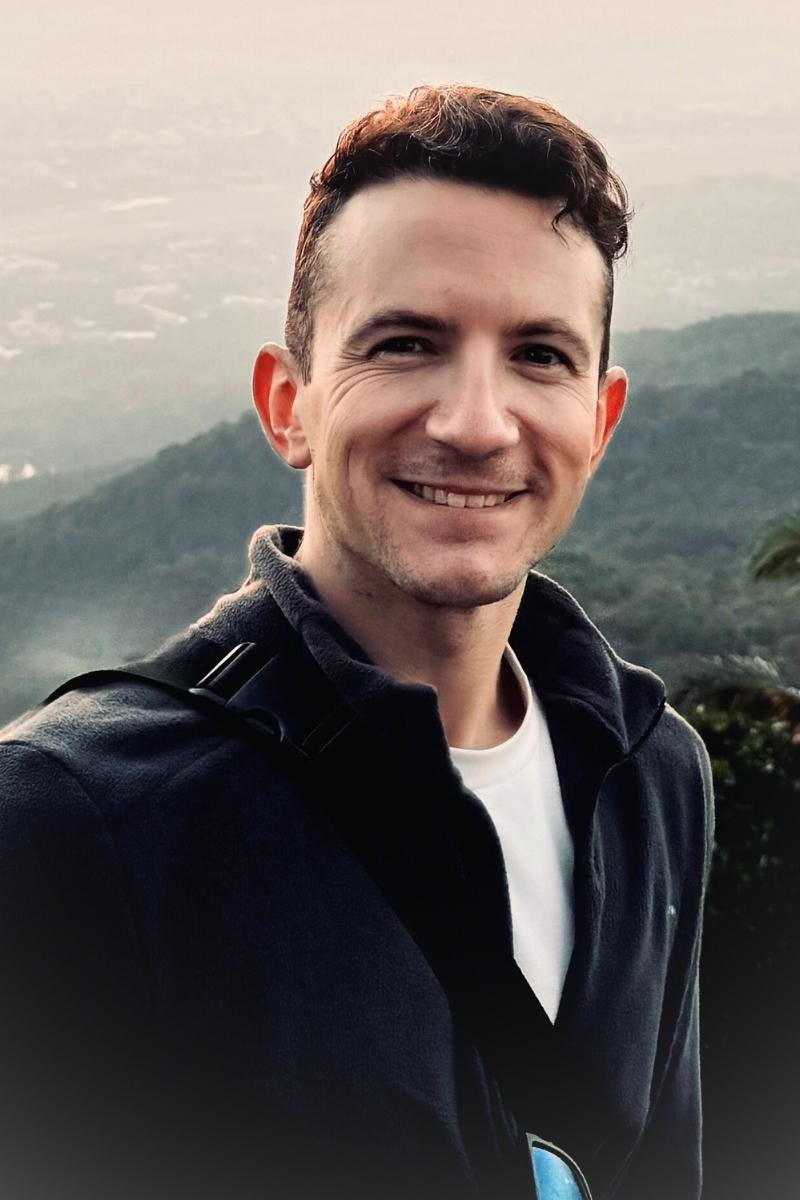Ok. Let’s break it down.
Coaching is a commonly misunderstood profession.
Considering it is unregulated - meaning anyone can call themselves a coach - it’s important to sort the wheat from the chaff.
We wouldn’t want you falling prey to the first ‘coach’ on the internet promising you the world, now - would we?
Hell. No.
There is an ever-growing number of online coaches out there, making it a rapidly expanding industry, currently estimated at $7.31 billion.
As AI continues to fuel the productivity machine, demand for real human connection is increasing. More people are seeking out support to help facilitate personal growth every day.
With that, you get more ads, more suggested garbage and more sponsored junk.
It’s a jungle out there. Everyone’s throwing their fix in your face.
But in here, it’s a retreat. Take your time, browse freely, in peace.
This week’s letter will give you clarity to navigate the coaching space with ease.
Contents:
What is coaching, and how is it different to therapy?
What could coaching help you achieve?
Why did I become a coach?
Who to consider hiring as a coach?
When is the best time to hire a coach?
Why work with me?
1. What is coaching, and how is it different to therapy?
Put simply, a therapist will help you understand where you are.
A coach will help you get to where you want to be.
Where a therapist offers diagnosis and theory, a coach provides practical, solution-based approaches.
The division is not set in stone. Some coaching falls under the terms of therapy and vice versa. What is important to understand is: there is no one-size-fits-all.
Ultimately, this decision comes down to what your desired outcome is.
Therapy looks at the past.
Do you want an explanation for your behaviour patterns? Get a therapist.
Coaching looks to the future.
Do you want to break behaviour patterns and grow better ones? Get a coach.
Both are necessary and cater to different circumstances.
Often, the most effective therapists and coaches are people who have lived through traumatic or difficult experience(s).
And, based on what they learned, seek to share their wisdom with others facing challenges that they have already overcome.
Because some lessons can only be taught by life.
2. What could coaching help you achieve?
Ever hit a point where you feel stuck?
No matter what you try, nothing seems to work?
This is the moment a coach helps you crack open the next stage of your life.
I recently worked with Susan. Having come out of a toxic relationship, she was deeply hurt and scattered. Her compulsive people-pleasing was eroding her joy and energy.
Over 4 weeks we worked together, she reclaimed her presence and self-belief.
To begin with, she thought:
She had to hold everything together for everyone else.
Her self-worth depended on how well she was perceived by others.
She had to be the rescuer and responsible for everyone else's well-being.
We spent time unwinding where these beliefs came from, which part was responsible for holding onto them and what was necessary to rebuild self-trust.
Using the self-journeying process and regular practices, by the end of our 4th session, Susan was:
Grounded and calm – moving from intention and not reaction.
Able to be present without reaching for distractions or coping mechanisms.
Much more confident – coming across on our video call, emphatically.
With the guidance of a coach, through reflection and precise questions, you will reclaim clarity and experience breakthroughs in your behaviour and beliefs.
In my own life, I worked with a coach after losing a job that I loved and having my world shattered by a brutal break-up.
I was seeking guidance in building a business, but over the 12 weeks, much more came to the surface.
I broke free from limiting patterns, conditioned identities and removed my blinkers. It helped me take responsibility. For most of my life, I had felt like a boy. Coaching was the catalyst that lead to me stepping up as a man.
3. Why did I become a coach?
It was inevitable.
After experiencing crippling loneliness, unworthiness and depression throughout my younger years, discovering the antidote compelled me to share it with others.
Despite a master’s and working background in engineering, the dots never connected.
I found my way to scuba diving.
Teaching in the Caribbean and living the island life was amazing. But it crumbled, because I was harbouring shadows that did not want to be buried.
It was after facing the darkness within me, alchemising pain into power, when I realised:
This is my calling.
I embody true passion and empathy because I have lived and learned from pain.
This is why I became a coach.
Shadow work is my specialty.
Based on which I created the process of self-journeying.
It's powerful. And it works.
As a dive instructor, I guided people safely through the ocean.
We start on the surface, learning about equipment, staying shallow to begin with. With more training, we slowly descend deeper, exploring the ocean in more depth – so we can discover more mysteries and more wonders.
Now as a coach, I guide people safely through their mind.
We start with the basics, breathing and mindfulness. We slowly introduce the idea of parts once a safe and trusting foundation is established. As courage grows, we go deeper, meeting those parts and reconnecting to them, forging complete self-trust.
Importantly, we go at your pace.
But probably not in a helicopter. Hmm, I really need a public speaking photo–
“We interrupt this post for a brief subscription break”
Real confidence isn’t performance. It’s presence.
No more second-guessing.
No more waiting to be ready.
No more asking for permission.
This is your moment. Claim it.
“Thank you. Now, back to the post.”
4. Who to consider hiring as a coach?
The most important part of a coaching relationship is mutual trust.
A coaching relationship is based on open communication. This is why it’s important to work with a coach who listens actively.
Not only that, but a coach who cuts through the noise and delivers precise questions and responses to facilitate your growth.
Take a look at the coach in question.
Ask yourself, can I trust them to deliver for me?
Plainly and simply, and if you cannot answer that question with a firm “yes”. Then another coach may be better suited to you.
Most coaches offer free calls to help you come to a decision. It is important to approach this with an outcome in mind.
Use these 3 pointers:
Does the coach take time to understand your unique problem?
Does their offered solution work for you?
What are you willing to invest in your future self?
It’s important to note, even the best coach will only take you as far as you are willing to take yourself.
This is why working with a coach who you trust is essential in maximising your results.
5. When is the best time to hire a coach?
As much as I’d like to say, right now.
That is not the truth.
The best time is the moment you act. Meaning, there is no ‘right time’, just your time.
And when it’s your time, intuition will drop hints.
Wondering about who you would become?
Always resonating deeply with what a coach says?
Thinking of reaching out but still putting it off?
This is the moment to send a signal (a.k.a. message):
For example: “Hey, I have been paying attention for a while now and just wanted to reach out… I’m curious about how coaching could help me, can you tell me more?”
Naturally, you will feel nerves and anticipation.
But on the other side of that, awaits a version of you that is exponentially better.
Now. When it comes to coaching, you may end up talking yourself out of it because of reasons including, but not limited to:
It’s uncomfortable asking for help.
It’s not the right time.
It costs too much money.
You are too busy for it.
But breaking through this barrier is the first step of your journey.
Because on a deeper level, it’s not about committing to coaching.
It’s about committing to yourself.
And when you realise that, it changes the whole picture.
The thing is, you aren’t broken. You never were.
Self-journeying helps you remember that.
6. Why work with me?
You read, listened and reflected.
You realised this is what I’ve been looking for.
I offer 1:1 clarity and confidence mentorship for those ready to drop the mask and finally live with real confidence.
Is it near impossible to hear yourself think?
Are you sick of bending over backwards pleasing everyone else?
Exhausted from being unable to trust yourself?
Done with self-limiting behaviour patterns and beliefs?
If you are tired of performance and ready to embody presence, this is for you.
As we work together, you will:
Build peace of mind using mindfulness, for a calmer, more present life.
Reclaim real confidence, by uniting your inner parts.
Develop self-belief and trust, to prioritise yourself without guilt.
Be able to live your truth without wearing a mask.
Working with me will give you the keys to your locked potential.
You have 3 options, each one tailored specifically to you and your needs:
A 60 minute hot-seat.
The 4 week path to confidence.
The 8 week walk within.
Visit this page for the details:
The door is open.
Feel the call?
Send the message. Let’s talk.
This was a coach collaboration.
Well-being coach
and I recently collaborated, creating two unique posts that strip back the fluff giving you a clear understanding of what coaching actually is.We connected over a love for drum & bass music and deep chats here on Substack.
Both of us have navigated mental health struggles and addictive patterns in different ways, turning pain into purpose through compassion, curiosity, and a whole lot of inner work.
As coaches, we’ve both seen the chaos online with everyone selling a solution.
But real healing doesn’t come from a trend. It comes from connection to someone who’s lived it and moved through it.
You don’t have to deal with this alone. You deserve clarity.
We're not here to fix you.
We're here to reflect you: calm, confident, whole.
Grace specialises in yoga, holistic healing and well-being. She leads a community called Healing Hearts Hub and also published her self-help book “Chill Out Cheer Up”.
Head over to her publication Mindful Moments to read her side of the collaboration and learn more about her work.










Therapy definitely doesn’t just look at the past. Therapy gives you skills so you can apply them to your life to create a better future.
This is a really helpful and practical summary, thank you for posting this!